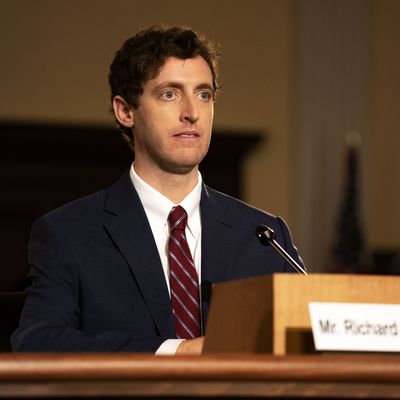
In the opening sequence of the final season of Silicon Valley, Richard Hendrix testifies before a Senate committee and does what he usually does: starts to completely blow it. But despite his decision to pace while holding an entire microphone console in his hands, the CEO of Pied Piper manages to turn things around when he rails on what the high-tech industry has become: a bunch of merging megacorporations only interested in mining consumers’ personal data for profit.
“I will help you end this tyranny,” Richard concludes, referring to his and Pied Piper’s master plan to create a decentralized internet, “by building an internet that is by the people, of the people, for the people, so help me God.”
The timing of this speech, and this episode, couldn’t be more spot-on, as it will be broadcast a few days after Mark Zuckerberg testifies before a congressional committee and while the Facebook creator is generating headlines for his acknowledgment that Russia and Iran are attempting to mount 2020 election interference campaigns on the social media platform. The first company that Richard shames by name during that speech in front of members of Congress: Facebook.
Even if this is coincidental, it’s still one of those moments that speaks to Silicon Valley’s ability to tap directly into the veins of tech culture. During its five seasons up to this point, one of the show’s greatest assets has been its gift for capturing the dysfunction of the start-up world with both enormous specificity and a universality that makes it relatable to anyone who has ever toiled away in a chaotic work environment. (Anyone who has ever toiled away in a chaotic work environment = basically everyone.) In the first three episodes of season six provided for review by HBO, Silicon Valley continues to succeed in that arena.
There’s a messy merger underway between Hooli and Amazon that’s fraying the already partially unraveled Hooli demon-in-chief Gavin Belson (Matt Ross). Richard, still played by Thomas Middleditch as a Zuckerberg-esque nerd whose default setting is “panic attack,” frets over internal matters that fly in the face of his vision for a less insidious internet, and also about how to secure more robust financial support for the company. (Apparently, bad-mouthing all the big boys of high tech on C-SPAN makes it harder to solicit funding?) But the biggest potential loss Richard deals with is the fact that his absurdly loyal but admirably rational right-hand man Jared (Zach Woods) may be leaving Pied Piper because he feels like he’s being pushed away from Richard and into a role that doesn’t interest him. The future of their relationship, at least in the beginning of the season, looms as large within the story arc as the future of the company where they both work.
Long before Succession came along, Silicon Valley showed us what it looks like when people in business go to extreme lengths to screw each other over in the interest of getting ahead, or sometimes just for the hell of it. Creator Mike Judge and the series’s writers have always had a knack for zagging when it totally looks like they’re going to zig, and for coming up with clever ways to resolve conflicts while creating a few more in the process. In episode three of the new season, for example, there’s a race to get much-needed signatures on a contract that unfolds in tandem with an actual marathon that Gavin is running. The suspense is as intense as anything that happens on a TV drama.
But Silicon Valley is not at all a drama. It never wavers in its desire to put the utter absurdity of its tech “geniuses” and their behavior on full display. Honestly, it’s been so consistently good at doing that that the show has been taken for granted in some ways.
Yet as fine-tuned as the series is, and as the cast continues to be — Middleditch, Woods, Kumail Nanjiani, Martin Starr, and Amanda Crew as the core of Pied Piper continue to hum along just fine without former co-star T.J. Miller — it feels absolutely right for it to be ending when it is. While the storylines still veer in unexpected directions, Silicon Valley has certain signature moves that have become pretty predictable at this point. Gilfoyle (Starr) still pulls pranks on Dinesh (Nanjiani), their love-hate relationship the same as it’s always been. Richard is, as ever, prone to spontaneous barfing during extremely stressful situations. At least the dynamic between Jared and Richard changes this season, which allows Woods to show a darker side of Jared than we’ve seen before.
Still, it feels like Silicon Valley is ending with just the right amount of gas left in its tank to finish the journey it began back in 2014. It also feels like the right time to end from a cultural standpoint. When this series began, it was focused on the act of creation, of the struggle to build from nothing a new company that would bring something different to the tech landscape. But as Richard says in that speech on Capitol Hill, it feels like this is a different time, one of consolidations, reining in, and reassessing rather than rampant invention. What does the future internet look like? Can it be a decentralized, more democratic place, as Richard envisions? In the real world, that seems hard to imagine. In Silicon Valley world, which spikes every drink of optimism with several shots of cynicism, that’s hard to imagine, too. But it’s worth continuing to watch this incredibly smart HBO series to see which direction things take. And I plan to. So help me God.





